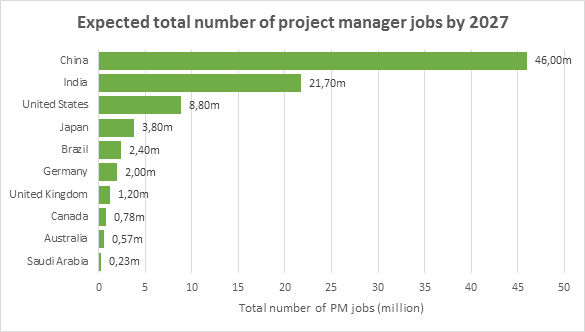 Until recently, many jobs simply didn’t exist. Take a wind farm engineer, for example, or an e-learning course developer. The rapidly emerging technology creates new occupations and changes the way people work.
Until recently, many jobs simply didn’t exist. Take a wind farm engineer, for example, or an e-learning course developer. The rapidly emerging technology creates new occupations and changes the way people work.
There is also a good deal of jobs which are not new, but remain overshadowed and blended into various other occupations.
This is the case of project management: surprisingly, it wasn’t officially recognized as a distinct occupation until recent time, when this professional occupation was included in the U.S. Department of Labor’s official statistics.
With that said, the importance of project management keeps growing in literally every field.
Project management is delivering value to businesses. Today, the project-oriented approach is being expanded even to those industries where it traditionally has never been used.
Take for example healthcare: in the last 5 years, the U.S. healthcare sector showed a 17% increase in project-oriented jobs – the biggest growth rate compared to other sectors. Among other industries that are adopting the project-based model, education, publishing, and entertainment are worth mentioning.
Statistics and research data show that project management proves its efficiency for businesses in many fields.
Why Is Project Management Important?
While project management has already been around for some time, it is not always mature. That’s why, its efficiency is sometimes still questioned.
We’ve all heard that “Keep up work” mantra of project managers, but it wasn’t really bringing us anywhere with the lack of defined objectives, poor communication, and weak executive support.
However, recent research of the Project Management Institute (PMI) shows that the situation is improving. Among the benefits project management brings to businesses, the following are worth mentioning:
-
Organizing chaotic environments
Rigid waterfall planning or agile change management – any project-oriented management methodology defines an action plan and prevents chaotic reactions to changes. Project management methodologies act as clear paths towards the set goals.
-
Achieving better performance
By optimizing resources and establishing plans, project management methods improve performance of individuals and teams. They also enforce teamwork
According to the PMI data, a growing number of organizations take up an agile approach to projects and implement a dedicated project management office (PMO) to ensure better project performance (71% today compared to 68% back in 2016).
-
Managing quality
Project management methodologies prescribe planning steps for identifying, monitoring and assuring quality of the end product – because it is the value of what the company produces.
-
Controlling costs
Project cost, being one of the most important project requirements, is also the hardest one to manage. Project management strategies provide procedures that reduce the risk of budget overrun and ensure on-budget delivery.
-
Learning from failures
Projects do fail, but, as Henry Ford said, “failure is simply the opportunity to begin again, this time more intelligently”. Providing special steps and reserving time to analyze failures is what project management techniques prescribe. Lessons learned are used in the future and drive business to success.
Project Management Recognition
Today, the demand for project management specialists keeps growing, as the chart of Bureau of Labor Statistics shows. The data by PMI predicts exponential growth for the next decade.
It is expected that employers will need around 87.7 million project management professionals by 2027.

The Bureau of Labor Statistics predicts the fastest growth rate for project managers in IT: 12 percent, faster than the average for all occupations.
As we mentioned earlier, more industries are choosing a project-oriented approach. According to the above cited PMI report, the top 7 industries with a strong focus on the project model are:
- Manufacturing
- Business services
- Finance and insurance
- Oil and gas
- Information services
- Construction
- Utilities
So we see that quite a few economically important industries are using the project-based model to run businesses. But, the new trend is that even more new industries adopt that model.
As a result, qualified project management professionals are increasingly in demand. We also see that more organizations are giving high priority to developing the technical and leadership skills of their employees (32% today compared to 29% in 2016).
Now think about the financial impact of this job market’s growth. Looking globally, an estimated GDP output of project-oriented industries will reach $20.2 trillion in the next decade, while the lack of qualified talent could result in a potential loss of billions of dollars.
It looks like project management has indeed an enormous potential in driving economic growth.
Summary
It might seem that a project-based approach can be used only in certain industries and as such, can bring only limited value to the economy.
This is no longer true.
More and more organizations realize the value of project management and implement its methods to drive strategic initiatives. Industries that have never been project-oriented before – such as healthcare or publishing – are suddenly finding that with project management, they can better reach their goals and save costs.
This causes a shift in strategic thinking. As a result, a demand for project management talent grows steadily, as grows the number of organizations with a PMO in their structure.
At the same time, not all senior executives and business owners fully realize the importance of project management yet. There is still a long way to go, and we are going to see very exciting changes in the coming decade.















































![9 Best Contractor Time Tracking Apps for 2026 [Free & Paid]](https://www.actitime.com/wp-content/uploads/2020/10/how-to-find-efficient-contractor.png)

